For companies that ship frequently, transportation costs are no joke. International shipments get pricey very quickly and the process can often be a headache. Any company that imports is required to add customs bonds into their mix of required purchases.
Customs Bond Options
A customs bond is a government issued bond that grants a company or person the ability to import goods with a commercial value in excess of $2,500. When it comes to customs bonds, you or your company have two options:
- Single-Entry Customs Bond
- Continuous Customs Bond
A Single Entry, or Single-Transaction customs bond is a customs bond that is valid for one shipment. In other words, if you were importing a container with a commercial value in excess of $2,500, the shipment would need to be bonded. If you were to purchase a single-entry or single-transaction customs bond, it would cover this shipment. However, it would only cover that shipment. For any other shipments, you would need to obtain additional single-entry customs bonds.
A Continuous, or Annual customs bond is a customs bond that is valid for any and all shipments that happen within 1 year after the date of purchase of the bond. Once the bond has been purchased, all shipments over the next 365 days are considered “bonded” and are covered by your annual customs bond. Make sure to understand the bond renewal process so you don’t end up with an expired bond!
Importance of Continuous Customs Bonds
Which bond you select will greatly depend on your company’s shipping situation. As you might imagine, single-entry bonds are great for companies that do not ship very frequently. If you are moving a couple containers per year, the cost of obtaining a few single-entry bonds will be far cheaper than an annual customs bond. If your company ships more frequently, continuous customs bonds may be a cheaper solution.
Despite the exact number of shipments your company does per year, there are a few reasons that we believe it is important to obtain a continuous customs bond. If your company has been purchasing single-entry bonds for a while, or has not yet begun shipping internationally, take these tips into consideration when selecting a customs bond:
1) Less Hassle
Whenever you have a container coming into the United States, a customs bond must be purchased. For the bond to be active and in-play for your next shipment, you must fill out a form, file it with U.S. Customs’ ACE system (Automated Commercial Environment), and wait for the bonding companies to associate your bond with a true federal ID number. It’s not a ton of work, but if you are continuously importing under Single-Entry customs bonds, you are going to feel the drag of repeating the process. Do yourself a favor and purchase a continuous customs bond (or annual customs bond) to lessen the hassle associated with Customs document and bond filing.
2) Cheaper
We have talked about the difference in price between single-entry and continuous customs bonds in prior articles. As stated before, the cost of importing under Single-Entry customs bonds gets very expensive as time goes on. Depending on your shipments, you may find that a continuous bond is cheaper even for a couple of imports. Here’s why.
The price of a single-entry bond will fall somewhere between .5%-2% of the commercial value of the goods you are importing. In addition, factors such as risk of the shipment, liability, country of origin, and others can all further influence the price. Thus, for customers who are importing very large, expensive commodities, they may find that a single-entry customs bond is far out of their price range.
The price of a continuous customs bond on the other hand can start at around $500. The above factors (risk, liability, COG) can also greatly influence this price, but in many cases, customers may find that a continuous bond for a single shipment will be cheaper than one single-entry bond. Talk with your carrier or freight forwarder about which one will be cheaper.
3) Better Communication
Let’s be honest – less documents and less emails means better communication. Continuously having to bother your freight forwarder through the process of purchasing, filling out, and filing your single-transaction customs bonds will bog down your communication and place your focus elsewhere. You need to focus on the important matters at hand, and frankly, obtaining a customs bond is often the last thing on anyone’s mind. Communication with your forwarder is important and continuous customs bonds offer an easier way to handle the process.
Conclusion
Customs bonds need to be purchased, filled out, filed with customs ACE (Automated Commercial Environment), and then validated by bond companies. The process can be grueling if you’re doing it frequently which gives continuous customs bonds the advantage. However, continuous customs bonds are commonly a better bond choice even for customers who import infrequently. Depending on your company’s import situation, continuous customs bonds may be significantly cheaper than single-entry bonds.
Take time to talk with your freight forwarder or carrier about which customs bond is right for your business. If you would like to learn more about the topic, or need help purchasing a bond, call one of our team members. We are very experienced in the subject matter and are happy to help you with all your customs bond questions!

One thought on “Importance Of Continuous Bonds: Customs Bonds”